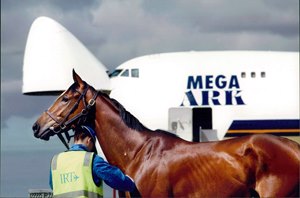Breeders' Cup Makes Plans for Travel, Quarantine, HISA


Despite a few regulatory and logistical curveballs, transport and quarantine preparations for the November 4-5 Breeders' Cup World Championships at Keeneland are proceeding on pace and officials say they expect no disruptions.
Some wondered whether the closure of Arlington International Racecourse might affect the ability to ship into, and quarantine at, the Chicago-area track. And there was some initial confusion surrounding the first shipment of international runners to New York after the effective date of new safety regulations promulgated by the Horseracing Integrity and Safety Authority.
Breeders' Cup officials, however, say most horses arriving from overseas will be flown directly into Kentucky, landing at Louisville Muhammad Ali International Airport and moving directly to a temporary quarantine facility at Keeneland.
Matt Haug, general manager of International Racehorse Transport at Arlington, said his firm will continue operations there until a new facility is built nearby and there will be no interruption of service. He said it's likely the only Breeders' Cup horses coming through Arlington will be from Japan.
There also reportedly were some HISA concerns that were addressed quickly in the days before the Caesar's Belmont Derby Invitational (G1T) and Belmont Oaks Invitational (G1T) July 9.

By far the more complicated, expensive, and time-consuming aspect of international participation in the World Championships is travel and quarantine, said Dora Delgado, Breeders' Cup's executive vice president and chief racing officer. Breeders' Cup routinely makes its own arrangements for much of that.
"At every host track we set up temporary quarantine facilities for up to six different shipments that come in so they can quarantine and then immediately be able to train," she said. "We determined a long time ago that the best way to keep these horses in top form was to actually have them come into the track, clear where they are, stay where they are, and then immediately be able to go out and train.
"At Keeneland, what we'll do is take three barns on Rice Road and convert them to USDA (U.S. Department of Agriculture) specs."
That's not a simple process because of the USDA requirement for the facilities, she added. Among those are a "strong preference" that horses in quarantine be held on concrete surfaces to prevent groundwater contamination.
Noting that no host track would be willing to have its barns rebuilt to that requirement, Delgado said Breeders' Cup negotiated a compromise involving the installation of a water-impervious barrier under normal footing. The Rice Road barns also will be fitted with double screening and airlocks to prevent cross-contamination by flies, birds, or other potential disease vectors.
Delgado said she expects most of the European horses to arrive in Louisville and immediately van to Lexington.
"We always do a charter from Europe anyway to pick up horses from France, Ireland, and England," Delgado said, "because if we let everybody book their own travel, I'd need like 15 (quarantine) units. We've got to get them all together as much as we can.
"Normally, Ballydoyle, the Coolmore horses, will do their own plane. Godolphin will do their own plane. The Japanese will probably go through Chicago just because it's what they're used to doing. When they come down from Chicago, they'll already be cleared."

IRT's Haug said other than charters like those arranged by Breeders' Cup, international horse transport has become more difficult in the past few years and, while he expects to handle this year's Japanese visitors, scheduling is in flux.
"It depends on what routes are available and how close they can get them to Keeneland," Haug said. "Chicago is really important to the Japanese."
"It's more difficult than ever now because the airfreight is so expensive and it's in such high demand that it's very hard to get an airline to divert a plane and take them out of their schedule."
Haug said Churchill Downs' quarantine facilities are recognized by the USDA as permanent facilities and could be used to clear horses before shipment to Keeneland.
Churchill Downs officials did not reply to inquiries about their expectations for Breeders' Cup runners or for any potential foreign competition for the "Arlington Million Day" set for Aug. 13 at the Louisville track.
Regulatory hurdles have been compounded as HISA rules are superimposed over those of state racing boards and commissions. Among the issues was HISA registration, which normally is linked to state licensure. Since Europeans coming to New York were not licensed, HISA officials reportedly had to push back the timing for them get clearance to start or ride horses at Belmont Park.
